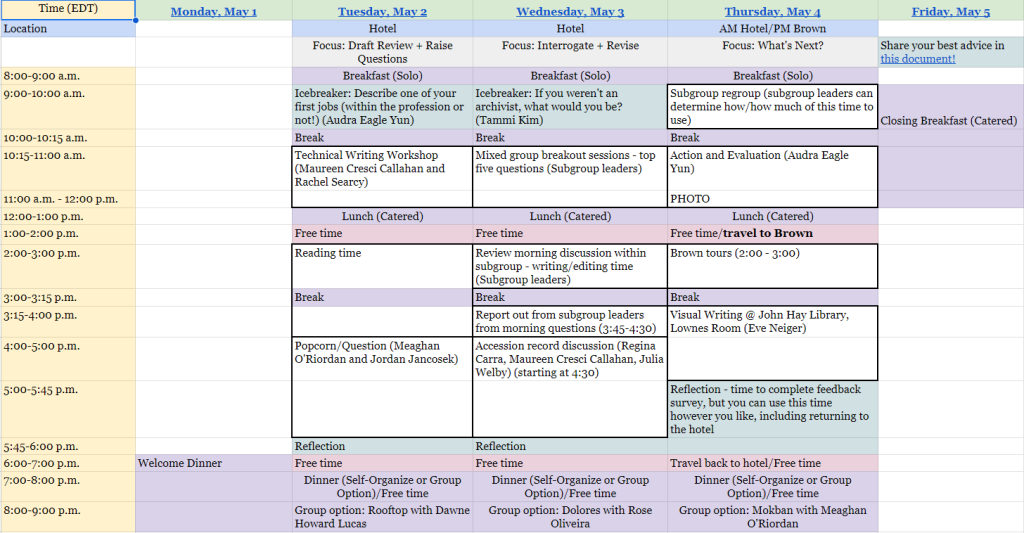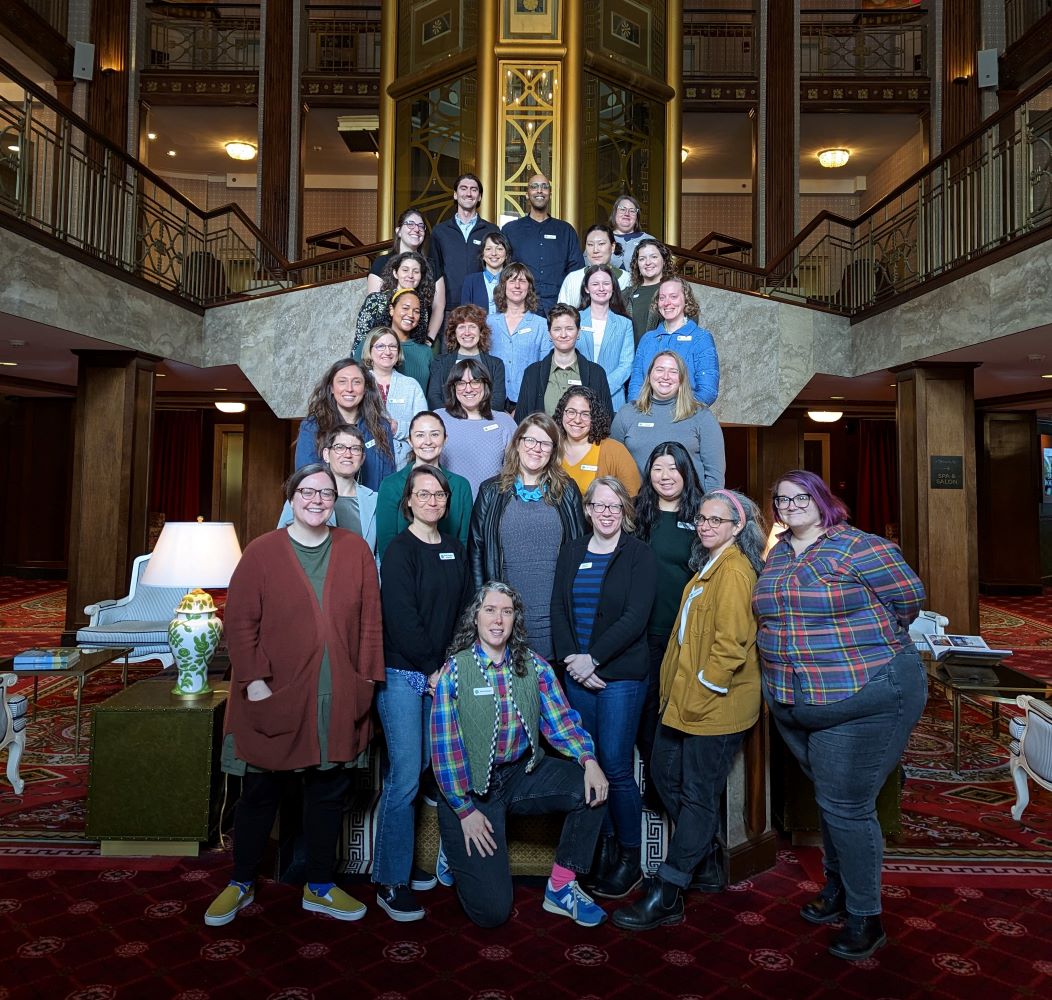By Meaghan O’Riordan and Rosemary K.J. Davis
Image above: Attendees at the Accessioning Best Practices Summit, May 2023 (names at bottom of post)
The Accessioning, Acquisitions, and Appraisal Section of the Society of American Archivists is home to the National Best Practices for Archival Accessioning Working Group, which has been active since mid-2020. The group was proposed and established by me, Meaghan O’Riordan, and my amazing friend and collaborator, Rosemary K.J. Davis.
We found ourselves sitting next to each other while attending a session at the 2019 annual meeting of the Rare Book & Manuscript Section of ACRL/ALA, commiserating over the shared experience of being asked to manage the function of accessioning without having any experience with doing it in the past, as well as finding few existing resources to inform the work. We both knew of a few other professionals who focused on accessioning, but we weren’t connected as a community. Rosemary mentioned that she had this big idea to bring all the archivists she knew who shared our experience together in a room for a summit to discuss challenges and opportunities and share resources.
That discussion led to, first, a joint research project investigating the landscape of accessioning across the profession and, second, after the pandemic prevented us from continuing our work, forming the National Best Practices for Archival Accessioning Working Group. Four years after we sat in that session discussing a summit of accessioning archivists, the summit became a reality. We held the Accessioning Best Practices Summit from May 1-5, 2023, though we have been actively working together since 2020.
The Working Group is composed of over thirty archivists from across the country, selected from an applicant pool of ninety. Due to the size of the group, we were organized into five subgroups focused on specific aspects of accessioning work: (1) Pre-Custodial Work, (2) Arrangement and Description, (3) Born Digital Accessioning, (4) Labor, Ethics, Relationships, and the Work Environment, and (5) Storage, Stabilization, and Preservation. Each group included people who had a particular interest and/or expertise in that aspect of the work.
For the first year of the project from 2020-2021, we focused on establishing a robust leadership team and fostering community among the whole group. We wanted to be intentional and thoughtful about how we formed this group, and make sure we set ourselves up for success since we knew we had a long road to travel. The group didn’t write a single word of best practices for the first year. Instead, we frontloaded other work, such as a literature review and shared mind-mapping and brainstorming, to be more prepared and productive when we started writing.
One of the most tangible outcomes of the first year was the establishment of a shared definition of accessioning that clearly states the elements of accessioning work and why they matter. The definition the group wrote is:
Accessioning is the basis of all archival stewardship. It is a suite of activities through which we appraise, transfer, stabilize, and document archival acquisitions. Accessioning provides pathways to access, informs future decisions, and promotes sustained resource commitment for the care of archival materials.
This definition is the guidepost for the group as we write the best practices.
In 2021-2022, the Working Group started writing. The initial writing activities were completed within the smaller subgroups, including outlines and first drafts, and focused on the aspect of accessioning work that was the expertise of each subgroup. As is true for accessioning work in practice, the content the subgroups produced naturally overlapped, but that made for a rich selection of text to choose from when combining the sections into one cohesive draft. The goal was to finish the separate subgroup drafts prior to the Summit.
That’s right, the conversation that Rosemary and I had in 2019 about hosting a summit of accessioning archivists was finally going to come true! Early in our work on best practices, we applied for a National Library Grant from the Institute of Museum and Library Services (IMLS) for the 2020-2021 cycle. Our preliminary proposal was unsuccessful, and we felt that the reviewers didn’t really “get” what we were trying to do. We tried again during the 2021-2022 cycle, after the work was already underway, making edits based on the feedback we had received, as well as crossing our fingers for a different group of reviewers. We intended to hold the Summit either way, but we knew it would be a much more inclusive and successful event if we had funding. This time, we received the grant in the amount of $245,963, most of which would be put toward the Summit.
The Accessioning Best Practices Summit was held from May 1-5, 2023, in Providence, Rhode Island. In the fall of 2022, an additional subgroup was formed to help plan the Summit, and we stayed in touch with the rest of the group to make sure we were considering everyone’s needs and preferences as much as possible. 31 people of our 32-person group were able to attend the event. The grant paid for:
- Travel to/from and around Providence
- Meals outside of catered lunch + catered lunch
- Accommodations at the Graduate Hotel
- Conference room rental and AV at the Graduate Hotel
- Supplies
- Pretty much everything except alcohol!
Everyone is also receiving a stipend each of the two years of the grant to pay them for their labor and energy in contributing to this project. The remainder of the funding will be used to host a public forum event adjacent to the SAA Annual Meeting in 2024 to share and promote the best practices.
The bottom line is there is no way we could have gotten 31 archivists in the same place at the same time to talk about accessioning without the funding from IMLS, and we were all so pleased with the Summit. Here is a snapshot of the schedule of events:

We tried to create opportunities for learning and participation through a variety of modalities and for different levels of interaction, from full group to small group to one-on-one or solo. Each evening, there was an option to have a group dinner with one of the members of the Summit subgroup, but this was not required. We had extremely productive discussions that led us to a combined first draft with a new structure that felt really good to everyone.
Over the summer, we worked on revising and reviewing that draft internally while leadership determined how to organize our work for the final year. The Working Group reorganized effective September 5, 2023, and our new structure is composed of even smaller groups focused on more specific goals with concrete deliverables. Our plan is to have a circulation draft ready by the end of January 2024 to share with external stakeholders for feedback and then revise and polish for final publication ahead of the 2024 SAA Annual Meeting.
I could say so much more, especially about the Summit, but this is a blog post and not a dissertation, so I will leave it here and invite you to reach out to us at accessioningresearch@gmail.com if you would like to know more about the work that we’ve done or will do for this last year. You can also keep up with us at our website, via Slack, and through the Accessioning, Acquisitions, and Appraisal Section of SAA. And keep an eye out for the publication of the Best Practices for Archival Accessioning in 2024!
Meaghan O’Riordan is the Archivist for the Moravian Church in America, Southern Province. Prior to her start with the Province in August 2022, she was the Accessioning Archivist for Emory University’s Stuart A. Rose Manuscript, Archives & Rare Book Library from 2016-2022. She holds bachelors degrees from North Carolina State University, a masters in library science from the University of North Carolina at Chapel Hill, and a masters in theological studies from the Candler School of Theology at Emory University. In addition to co-chairing the Best Practices group, Meaghan also serves on the Steering Committee for the AAA Section and the UNC SILS Alumni Association Board as the treasurer (2020-present), and she founded and chairs the Airtable for Archives Community of Practice.
Rosemary K.J. Davis is the Head of Archival Accessioning for the Beinecke Rare Book and Manuscript Library at Yale University. Prior to joining the Beinecke, she worked at institutions, including Amherst College and Duke University’s Rubenstein Rare Book and Manuscript Library. She received her masters of science in library and information science (MSLIS) and Archives certificate from Pratt Institute and her bachelors with concentrations in Art History and Writing from the New School. In 2015, she was awarded an IMLS-RBS Fellowship for Early-Career Librarians. In addition to co-chairing the Best Practices group, Rosemary is the Managing Editor for the Journal of Contemporary Archival Studies.
Group photo: Row 1 (Front): Rosemary K.J. Davis, Emily Hughes Dominick, Kate Dundon, Juliana Kuipers, Rose Oliveira [new last name], Meaghan O’Riordan; Row 2: Christine Bethke, Rosalie Gartner, Maureen Cresci Callahan, Kelli Yakabu; Row 3: Brittan Nannenga, Regina Carra, Eve Neiger; Row 4: Dawne Howard Lucas, Jasmine Larkin, Kit Messick, Kit Fluker, Katrina Windon; Row 5: Rachel Searcy, Jaime Henderson, Jennifer Coggins, Cate Putirskis; Row 6: Julia Welby, Margo Padilla, Tammi Kim, Audra Eagle Yun; Row 7 (Back): Jesse Hocking, Haian Abdirahman, Nikki Lynn Thomas; Not pictured: Matt Francis, Emily Higgs Kopin, and Jordan Jancosek


2 thoughts on “Slow Burn: Building an Archival Accessioning Standard with Intentionality”